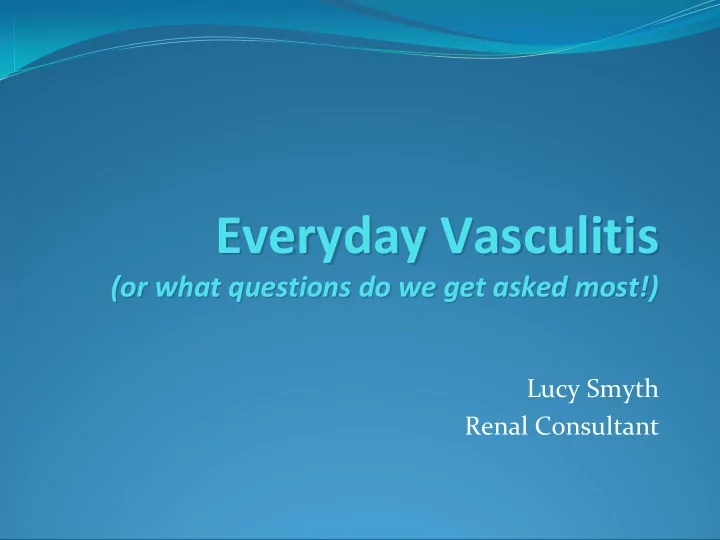

Everyday Vasculitis Everyday Vasculitis (or what questions do we get asked most!) (or what questions do we get asked most!) Lucy Smyth Renal Consultant
What is it? Why have I got it? How can we treat it? Why do I feel like I do? What do the blood tests mean? Will it go away? What can I do to help myself?
What is it? Vascul = blood vessel itis = inflammation Can affect small, medium and large vessels Varying patterns of disease according to the vessels affected
Kidneys Glomerulonephritis = inflammation of the filters Blood and protein in urine Joints Rapid deterioration of function Synovitis = High blood pressure inflammation of joint lining General Lungs Eyes Night sweats Pulmonary haemorrage = bleeding Weight loss Inflammation Infiltrates = inflammation Tiredness Nerve damage Granulomas = inflammatory lumps Rash ENT Gut Nerves Deafness Bleeding Weakness Sinusitis Pancreatitis Loss sensation Nosebleeds Confusion Nasal crusting
Why have I got it? The way your immune system is made up Genetic, but not directly inherited What your immune system has come across Environment The way your immune system has reacted to it Often a trigger, eg infection
ANCA (anti neutrophil cytoplasmic antibodies) Antibodies that bind to certain white blood cells Cause the white blood cells to release toxic substances Causes inflammation of the blood vessels
ANCA (anti neutrophil cytoplasmic antibodies) P-ANCA C-ANCA
How can we treat it? Hit it hard Induction treatment Keep it under control Maintenance treatment Slowly try to wean down/off According to disease activity P-ANCA min 2-3 years, c-ANCA min 5 years
How can we treat it? Cyclo Steroids AZA
Cyclophosphamide Induction The oldest, and not yet surpassed Much shorter courses now: 3 months = minimal toxicity Knocks out the antibody producing B cells Careful monitoring: weekly bloods Oral or IV pulses Risks Infection, low WBC, hair thinning, infertility, malignancy
Azathioprine Maintenance Oldest and not yet surpassed Blocks turnover of inflammatory cells Need to check TPMT level Oral, once daily Monthly bloods Risks Infection, nausea, liver inflammation, low WBC, skin malignancy
Steroids Induction / maintenance Important for early control of inflammation No one has yet found a way of avoiding them Trials being proposed to minimise dosing regimes / avoid Risks Infection, bruising, diabetes, osteoporosis, thinned skin
How can we treat it? Plasma Exchange Cyclo Steroids Rituximab AZA
Plasma Exchange At start of induction treatment Current indications: Creatinine >500 Pulmonary haemorrhage Removes circulating ANCA Similar to dialysis; daily sessions for a week Risks Infection, bleeding, allergic reaction
Rituximab Induction if cyclophosphamide unsuitable Relapses at induction or maintenance Also knocks out B cells Similar efficacy as cyclophosphamide, no fewer risks Slower onset 2 infusions at 2 week interval, then every 6-18 months Risks Infection, infusion reaction, low general antibody level, PML
How can we treat it? Plasma Exchange Cyclo Steroids Rituximab MMF MTX AZA
Mycophenolate Mofetil Induction if disease mild Maintenance if azathioprine not tolerated / effective Oral, 2-3 x day Monthly bloods Risks Infection, nausea, diarrhoea, anaemia, low WBC
Methotrexate Induction / maintenance Especially good for granulomatous disease ENT and lung masses in GPA Can’t use for renal disease or if renal dysfunction Weekly, usually oral Monthly bloods Risks Infection, nausea, lung or liver inflammation
And the extras… Stomach • omeprazole/lansoprazole protection • ranitidine • Septrin (Pneumocystis / staph) Infection • Nystatin (fungal) • Calcium/vitamin D Bone protection • Bisphosphonate • Ramipril Blood pressure • Amlodipine
Why do I feel like I do (tired)? Inflammation causes fatigue Medications can cause fatigue (steroids) Inflammation, medications and renal dysfunction cause anaemia, which causes fatigue Illness causes deconditioning
anaemia Will improve gradually As inflammation settles When you come off cyclophosphamide If renal function improves If left with significant renal impairment you may need Iron Erythropoietin
What do the blood tests mean? CRP Increases with inflammation or infection: aim <5 Haemoglobin Marker of anaemia: aim >120 WBC Avoid dropping below 4 Creatinine / eGFR Marker of renal function: will find new baseline ANCA Disease activity may affect MPO or PR3 titre
Will it go away? You will always have the tendency to have vasculitis Relapses reported at 50% in 5 years (less now?) You may be able to come off treatment You may stay off treatment
Risk of relapse increased by… C-ANCA ANCA positivity Rapid reduction in treatment Lack of steroid
What can I do to help myself? Don’t worry if you don’t take it all in at once You will get to know your disease Take your medication We can try and minimise side effects together Make sure you have blood tests when needed Keep up to date with vaccinations
What can I do to help myself? Contact GP or consultant if you are unwell Keep active, build up your fitness again Eat healthily; stick to renal dietary advice if needed Stop smoking
And join the West Country Vasculitis Support Group! Thank You Many thanks to Charlotte and Angie for arranging the evening
Recommend
More recommend